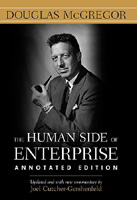《企業中人的方面》
出自 MBA智库百科(https://wiki.mbalib.com/)
- 作者:道格拉斯·麥格雷戈(Douglas McGregor)美國著名的行為科學家,人性假設理論創始人,管理理論的奠基人之一,X-Y理論管理大師。
- 首次出版:1960年
- 全書名:《企業中人的方面》(The Human Side of Enterprise)又譯:《企業的人性面》、《企業的人性方面》
目錄 |
From The Publisher:
McGregor's timeless principles and influential thinking--now updated for a new generation of managers
First published in 1960, The Human Side of Enterprise has become a worldwide management bible. Douglas McGregor's revolutionary Theory Y—which contends that individuals are self-motivated and self-directed—influenced major management gurus such as Peter Drucker and Warren Bennis. This annotated edition shows how today's leaders successfully incorporated McGregor's methods into modern management styles and practices to nurture leadership ability, create effective management teams, provide better feedback, achieve high performance, and cultivate a value-driven workplace.
"With every passing year, McGregor's message becomes ever more relevant, more timely, and more important."—Peter Drucker
Douglas McGregor is one of the most influential management thinkers of all time. His Theory Y approach is at the core of virtually all of today's leading management and workplace models. He was a founding faculty member of MIT's Sloan School of Management and served as president of Antioch College.
Joel Cutcher-Gershenfeld is a Senior Research Scientist in MIT's Sloan School of Management and Engineering Systems Division, where his scholarship centers on underlying values and assumptions about people at work, in organizations, in complex systems, and across societies-building on and extending the core of McGregor's contribution.
- Preface、
- 1、Management and scientific knowledge 3
- 2、Methods of influence and control 19
- 3、Theory X : the traditional view of direction and control 43
- 4、Theory Y : the integration of individual and organizational goals 59
- 5、Management by integration and self control 83
- 6、A critique of performance appraisal 105
- 7、Administering salaries and promotions 121
- 8、The Scanlon plan 145
- 9、Participation in perspective 165
- 10、The managerial climate 179
- 11、Staff-line relationships 197
- 12、Improving staff-line collaboration 213
- 13、An anlysis of leadership 243
- 14、Management development programs 259
- 15、Acquiring managerial skills in the classroom 281
- 16、The managerial team 307
- Conclusion to the annotated edition 331
“What are your assumptions (implicit as well as explicit) about the most effective way to manage people?”
So began Douglas McGregor in this 1960 management classic. It was a seemingly simple question he asked, yet it led to a fundamental revolution in management. Today, with the rise of the global economy, the information revolution, and the growth of knowledge-driven work, McGregor's simple but provocative question continues to resonate-perhaps more powerfully than ever before.
Heralded as one of the most important pieces of management literature ever written, a touchstone for scholars and a handbook for practitioners, The Human Side of Enterprise continues to receive the highest accolades nearly half a century after its initial publication. Influencing such major management gurus such as Peter Drucker and Warren Bennis, McGregor's revolutionary Theory Y-which contends that individuals are self-motivated and self-directed-and Theory X-in which employees must be commanded and controlled-has been widely taught in business schools, industrial relations schools, psychology departments, and professional development seminars for over four decades.
In this special annotated edition of the worldwide management classic, Joel Cutcher-Gershenfeld, Senior Research Scientist in MIT's Sloan School of Management and Engineering Systems Division, shows us how today's leaders have successfully incorporated McGregor's methods into modern management styles and practices. The added quotes and commentary bring the content right into today's debates and business models.
Now more than ever, the timeless wisdom of Douglas McGregor can light the path towards a management style that nurtures leadership capability, creates effective teams, ensures internal alignment, achieves high performance, and cultivates an authentic, value-driven workplace--lessons we all need to learn as we make our way in this brave new world of the 21st century.








